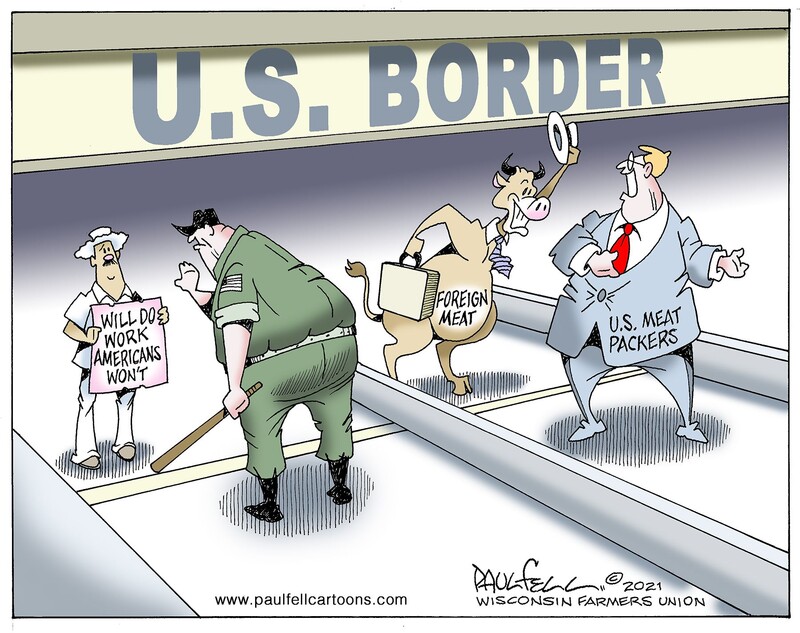Misleading ‘Product of the USA’ Label is Hurting American Farmers
It’s a rite of summer to fire up the grill and enjoy burgers and steaks cooked to sizzling perfection. Or, in sadder cases, charred to an unrecognizable blackened blob. Whether you’re one of the lucky folks feasting on a grillmaster’s gourmet handiwork or instead find yourself chomping charred protein, do you know where the beef on your plate originated?
After seeing store shelves stripped bare during the COVID-19 lockdown, consumers have become more conscious of the fragility of U.S. supply chains. Interest in buying locally surged, which is why more people are reaching for beef labeled “Product of the USA.” Many, understandably, think that in doing so, they are supporting U.S. farmers and buying beef from cattle born and raised in the USA.
Unfortunately, that’s where the disconnect lies.
Currently, meat can have a “Product of the USA” label slapped on even if it is imported and only repackaged at a USDA-inspected facility.
I think that's bologna. Thankfully, so does the National Farmers Union (NFU), and they've raised concerns about it, alongside ranchers and farm organizations from throughout the country.
Those efforts may be paying off. On July 1, the U.S. Department of Agriculture announced it would conduct a “top-to-bottom review” of the “Product of the USA” label.
This is good news for farmers and ranchers who recognize how the misleading label tricks customers into thinking beef and pork is truly an American product, even in cases where it was born, raised, and slaughtered in another country.
This isn’t just a problem for consumers – it hurts farmers who can’t differentiate their product while trying to survive against the competing powers of multinational corporations.
My family raises beef cattle in northwestern Wisconsin. We have marketed animals through conventional channels but are shifting to direct marketing meat to family, friends, and neighbors. The switch was spurred partly by our frustration at deceptive labeling and how, when marketed through traditional avenues, the beef from our steers – born and raised here in Wisconsin – has no edge in the marketplace over imports that are pouring into our country from places like Brazil, Mexico, and Canada.
The fact that our government allows “Product of the USA” on meat from an animal that never set a hoof on American soil should give us all pause. This loophole is among factors that are slowly and painfully pushing American farmers out of business.
The U.S. has experienced a concerning level of consolidation in agriculture. Four major meatpacking companies – Cargill, Tyson, JBS, and National Beef – control over 85 percent of the American beef market. In turn, farmers have incredibly little control over the slim margin they receive. For example, that top sirloin steak that averages $9.99 a pound? According to NFU’s tracking of USDA data, the Farmer’s Share is $1.90. Misleading labels exacerbate already difficult market conditions.
Still, farmers roll the dice. Many of us play the game because we feel a strong tie to the land and a desire to protect it for future generations. We believe that in a world where something as clear-cut as “Product of the USA” is being watered down, it’s important for there to be family farms – and organizations like Farmers Union – safeguarding our supply chain and providing an alternative to the sad status quo that has become the American food system.
As NFU President Rob Larew recently noted, “American consumers deserve to know where their meat comes from. Whether they want to keep their food dollar in their community, limit their food miles, or avoid unsustainable or unethical practices, there are many reasons why someone would want to know what country their meat was raised in. But as things stand, there’s no way to determine the origin of beef and pork since the wildly deceptive 'Product of the USA' label can appear on meat that spent its entire life in another country.”
Farmers Union, along with the U.S. Cattlemen’s Association, was a vocal advocate of Country-of-Origin Labeling (COOL) for meat, but the World Trade Organization deemed the labeling discriminatory against Mexico and Canada and Congress repealed the law. Yet we do label country-of-origin for many other products like lamb, fruits and vegetables, and clothing. Why should beef and pork be different -- other than the lobbying power of those oligopolies?It seems that the rights of other countries have risen above the right of Americans to know the origins of their food.
Please educate yourself and join in the efforts to remedy this labeling loophole. It’s purely common sense that the “Product of the USA” label be reserved only for meat products derived exclusively from animals born, raised, slaughtered and processed in the United States. You know, for products actually “of the USA.”
Danielle Endvick is the communications director for Wisconsin Farmers Union, a grassroots organization committed to enhancing the quality of life for family farmers, rural communities, and all people through educational opportunities, cooperative endeavors, and civic engagement. She raises beef cattle on her family’s Runamuck Ranch in Chippewa County.



Add new comment